
Fixed-rate mortgages have hit a record low, and banks are bringing in new customers with these low rates, but are these historically low fixed-rates as good as they sound?
On the one hand, locking in your rate now seems like an obvious idea, and will give you the certainty of what your repayments will be. This will also protect you from future rate hikes during your fixed-rate period.
However, a fixed-rate could also take away the flexibility to make extra payments or pay your loan off early. Some lenders attach penalties for paying off early.
Before locking in this fixed-rate, there are some things to consider.
What to consider first
- Can you make extra repayments? Before committing to a fixed rate, you need to understand if there will be any restrictions on making extra repayments. Some lenders may charge a fee for doing so, or limit the number of extra repayments that you can make during the fixed-rate period.
- Will you benefit from cash flow certainty? One of the big bonuses of a fixed-rate mortgage is that you as the borrower will know exactly what your repayment will be each month, as the interest levels will stay the same for the entire duration of the fixed-rate period. This can be very helpful if you are on a budget and can help you with cash flow.
- Will you be able to leave the loan early? Before deciding, confirm with your lender whether you will be allowed to repay early. Be clear if market interest rates fall a borrower could be up for a cost to compensate the bank. Break fees can be higher than the interest rates, so make sure you know the cost of early payment.
- What does the revert rate look like? The revert rate is the interest rate that a loan moves to after the fixed term period is over. These revert rates are generally higher, which may mean you have to renegotiate your loan at the end of your fixed-rate term in order to keep an interest rate that is competitive and payable.
- Are you locking in your repayments at a level that you can afford? A home loan with a fixed interest rate is for locking in repayments at a level that is affordable for the borrower, not about speculating on interest rate movements in the future.
If you aren’t sure whether you should be entirely locked into a fixed-rate term for a number of years, you could consider another option. You may be able to split your home loan and have a portion of the balance charged at a fixed rate over a period of time, and the rest charged at the more usual variable interest rates. This option is available at a number of lenders, so research all your options before you decide.
How to switch
If you’re going to refinance, this will require a whole new loan application. There will be a lot of paperwork involved and plenty of documents to sign first. This can be at least a few hours work but the savings can make the work well worth it. Here are the basic steps to take:
◼️ Check your current rate and begin to compare home loan options to find some better products.
◼️ Check the ratio of your loan-to-value. You can’t refinance unless you own at least 20% of the current value of your property. If your deposit was under 20% of the value and you haven’t paid off much of the loan yet, then switching will result in paying lenders mortgage insurance, even if you have paid it already. Property values have dropped during the pandemic, so you may not own 20% of your property’s value at the moment.
◼️ Find a mortgage that you think will work for you and submit an enquiry. After this, your lender will get in touch with you and help you through the process of applying. You can also talk to a mortgage broker, who will be able to help you to find the best option for you and apply for the right loan.
◼️ Gather any documents you need and submit an application. You will need to prove your identity and will need information about your bank accounts, assets, and any other debts. The lender will need to take a close look at your sending so make sure your finances are in good order before you apply.
If your application is approved then your new lender will take over your mortgage and handle the rest.
Bernie Kyne
Mortgage Consultant
0400141757
bernie.kyne@mortgage-express.com.au
Disclaimer: While all care has been taken in the preparation of this publication, no warranty is given as to the accuracy of the information and no responsibility is taken for any errors or omissions. The content of this article is general in nature and is presented for informative purposes. It is not intended to constitute financial advice nor is it intended to imply any recommendation or opinion about a financial product. It does not take into consideration your personal situation and may not be relevant to circumstances. Before taking any action in relation to the matters dealt within this publication, you should seek professional advice.



